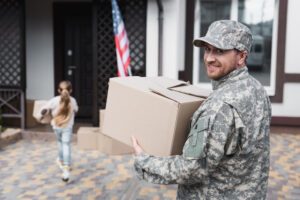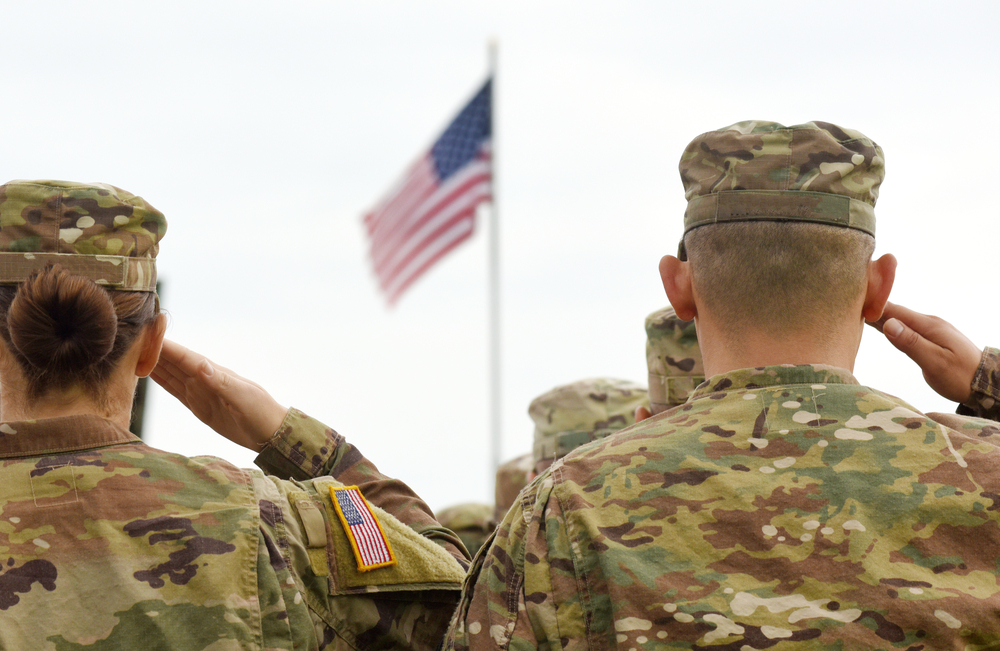A permanent change of station (PCS) is always an adventure. Regardless of whether this is your first or 15th move, relocation is always accompanied by stress. A PCS move requires a lot of organization, coordination, and planning, especially if you’re moving with children and pets.
In this military PCS guide, we’ll introduce you to a detailed PCS move checklist that should make your move as smooth as possible.
The Binder
Before we move along to the PCSing checklist, we need to mention the holy grail of PCSing: the binder. Whether you’re relocating interstate or overseas, you need to gather extensive paperwork. If you want to keep your sanity intact, it’s best to keep all important documents in one location, such as a binder. This will help you feel more organized because you won’t have to waste time searching for paperwork.
Here are the essentials you should include in the PCS binder:
- Personal documents
- Medical documents
- Passports
- Social security cards
- Insurance policies
- Marriage license
- Car and house titles
- Contact information for the current and future duty station
- Mortgage documents
- Housing application
- Military orders
- School records
- Pet information and veterinary records
- Moving documents
- Travel documents (flight and hotel information)
- Warranties
- Expense tracker
- Calendar
- “My PCS checklist” (the checklists we provide below)
PCS List

This PCS guide can also serve as a Navy PCS checklist. Keep in mind that these checklists are designed for moving interstate. If you’re going overseas, you’ll need to complete additional steps, depending on your destination and military branch.
Three Months Before the Move
The first list of this Army PCS guide contains the items you need to take care of about three months before your move.
- Schedule a counseling session at your Transportation Office. The employees will give you the necessary information regarding your PCS and explain your options.
- Choose if you want a personally procured move (PPM) or let the government handle it.
- Begin saving for moving expenses. The government will reimburse some of the costs, but not everything.
- If you have children, one of the PCS steps is discussing the relocation with them.
- If you’re renting the house you currently live in, inform the landlord you’ll be moving soon. Don’t give them the exact date yet.
- Research how you could ship your vehicle to the future base.
- Keep track of tax-deductible expenses related to moving.
- Create an inventory of all your belongings. You can use your mobile phone or camera.
- Start a PCS binder and organize the essential paperwork.
- Create a list of people you need to inform about your relocation.
- Create a list of clubs and organizations you’re a member of and inform them you’ll be leaving soon. Check whether certain memberships can be transferred.
- Schedule dental, medical, and optical appointments for you and your family members.
- Set up a power of attorney in case of unforeseen circumstances.
- Start sorting your belongings and separate those you wish to throw away, sell, or donate.
- Check your furniture for stickers from previous moves and remove them.
- If this is your first time PCSing and you need more PCS details, reach out to people that have already gone through the process.
Two Months Before the Move
The second list of this military movers guide encompasses everything you should do approximately two months before moving to a new location.
- Start getting rid of things you don’t want to move to the new location. You can organize a garage sale, post the items on online marketplaces, donate them, give them to family or friends, or throw them away, depending on their condition.
- If you want to purchase a home at the new location, research your options. Contact a realtor, arrange financing, etc.
- If you’re moving with employed family members, they should give notice at their jobs and get letters of recommendation. Moreover, they should update their resumes.
- Look into child care options at your new location.
- Check the schools at your new location and research enrollment requirements and schedules.
- If you have a vehicle, ensure regular maintenance and repairs are taken care of.
- Find proof of insurance for your vehicle and place it in the PCS binder.
- Reach out to your insurance company and check your options for insuring your vehicle, home, and valuable belongings in your new location.
- If you plan to ship your vehicle, inform the base transportation office and give the employees the estimated shipping weight.
- If you have pets, ensure they are fully immunized and get a copy of the medical records.
- Close local charge accounts.
- If you want, set up a bank account and a safety deposit box at your new location.
- If you need help organizing your finances, reach out to your military base finance center or a private financial advisor.
- Double-check the expiration dates on your credit cards and get new ones if necessary.
- Contact the Department of Motor Vehicles at your new location to get information about the new registration and driver’s license.
One Month Before the Move
The moving day is approaching. Here’s a military moving checklist of things you should get done about one month before relocating.
- Schedule pickup and delivery dates with your military moving company.
- Arrange temporary or permanent storage if necessary.
- If you still don’t know where you’ll live, obtain a post office box or set up a forwarding address for your mail.
- If you’re an active service member, check options for advanced pay or other benefits that could make the moving process easier.
- Get rid of the belongings you don’t want to take with you.
- Obtain your children’s school records or check how to transfer them to the new school.
- Arrange letters of transfer from your church, Scouts, or any other national organization.
- If your family is driving to the new location in two or more vehicles, you can buy walkie-talkies and make the trip much more fun.
- Double-check if all insurance is up to date. Inform the insurance company of the relocation and give them the new address.
- Return library books and items you’ve borrowed from family and friends.
- Ensure your vehicle(s) are in good condition and ready for the road.
- Fill out the IRS change of address form.
- Inform electric, water, disposal, telephone and cable companies of your move.
- Cancel local subscriptions.
- Disassemble outdoor structures (swing sets, playhouses, furniture, etc.).
Three Weeks Before the Move
This part of our PCS guide contains information on what you should do three weeks before moving.
- Active service members should reach out to their military pay office and recertify their Basic Allowance for Quarters (BAQ).
- Double-check the packing and moving dates with your moving company.
- Double-check the expiration date of your military card.
- Inform credit card companies of the new address.
- If you have an investment counselor, inform them of your relocation.
- Cancel newspaper delivery.
- Settle your bills (if possible).
- Transfer your bank account.
- Retrieve the belongings you’ve lent to family and friends.
- Contact the U.S. Post Office regarding your change of address.
- Create a meal plan to use all the food in your fridge and freezer.
- Start cleaning your sheets, carpets, curtains, etc.
- Renew your prescriptions and pack the medicine carefully.
- Active service members should separate their professional books, papers, and equipment (PBP&E). The weight of such items isn’t counted towards the total weight allowance.
One Week Before the Move
One week before moving to the new location is the perfect time to start thinking about the PCS details.
- Get small and large Ziploc bags. You’ll find them valuable when packing sets of small items like silverware, pencils, markers, spices, etc.
- Make copies of all important documents before mailing them or taking them with you.
- Clear out your attic and hard-to-access areas.
- Drain your garden hose.
- Drain gas from your lawn mower.
- Get rid of flammable items, batteries, cleaning supplies, and everything else the movers won’t pack.
- Take pictures of the back of appliances like TVs and computers so that you know how to plug in the cables correctly once you arrive at the new location.
- Plan the route and, if necessary, book hotel rooms to rest along the way.
- Inform your family and friends about your schedule and route.
- If you have a safety deposit box, close it.
A Few Days Before the Move
Besides creating a PCS packing list, now it’s time to cross these items off the list:
- Separate the items that won’t go with the moving company.
- Decide which items will be shipped as “unaccompanied baggage.”
- Create a detailed inventory list and keep it with you.
- Create an inventory of the boxes so that you can easily keep track of them later on.
- Use colored stickers to mark which boxes go to which room. If you’re using a moving company, you can create a color-coded map of the new house so that the movers know where to take each box. This can make the process much easier for both you and the movers.
- Keep your cash, important documents, and valuable items with you.
- Inspect and write down the condition of different items. There’s no need to do this for the things that look as good as new. But if you have a scratched table, mark it so that you know this didn’t happen during transport.
- Clean the fridge and freezer and leave the doors open for a few days.
- Get rid of opened cans.
- Throw away containers that may leak.
- If you’re taking liquid products with you, place them in waterproof bags.
- Disconnect all electrical and gas appliances. Remember that moving companies usually aren’t required to do this for you.
- Remove objects from walls and ceilings. These include paintings, lights, curtain rods, mirrors, decorative objects, etc.
- Remove TV antennas.
- Disconnect satellite dishes.
- Drain water from hot tubs, aquariums, and waterbeds.
- Prepare a first-day box. This box should contain everything you’ll need in your new home before the rest of your belongings arrive.
Moving Day
If you’ve used our PCS guide so far, you’ve completed most of your obligations. Now, the big day is here. Here’s what you’ll need to do on your moving day:
- Get up early. You want to be ready when the movers come to your house.
- Take all the trash out. If you don’t do this, the movers are likely to pack it. You don’t want to arrive at your new house with a bunch of trash.
- Do the dishes before the movers arrive.
- Prepare snacks and drinks for the long day. If you want, you can prepare refreshments for the movers as well.
- Double-check whether your money, mobile phone, jewelry, checkbook, and other valuable belongings are with you. It’s not recommended to ship these items.
- If you have pets, put them in a secure, confined area when the movers arrive. This will allow movers to work without distractions.
- Double-check all rooms inside the house to ensure you haven’t forgotten anything. Do the same for your shed, garage, and other spaces.
- Keep a marker with you. You’ll likely need to put a note on some of the boxes.
- If you’re taking some of the boxes with you, label them as “DO NOT MOVE.”
- Once the movers have packed everything, double-check their inventory.
- Monitor the loading process and examine your belongings before signing off the receipt.
- If your move is covered by the military, get a copy of the GBL, the Household Goods Inventory, and other paperwork before the movers leave. Put the documents in your binder.
- Leave your keys.
- Double-check that all the important documents are with you.
Upon Arrival
Congratulations! You’ve arrived at your new location. However, the PCS process isn’t finished just yet. Here is a list of things you should complete after arriving at your destination.
- Contact the Transportation Office as soon as possible.
- Reach out to the Household Goods Office to schedule the delivery of your personal property.
- If you changed states, register your car and get a new license.
- Register your children in school.
- Connect with doctors at your new location.
- Clean your new house before the movers arrive, especially the hard-to-reach areas.
- Once the movers arrive, double-check the inventory. Grab your inventory and compare it to the movers’ list. They should match.
- Know where each box and piece of furniture goes.
- Know your rights. The movers should unpack and reassemble everything they disassembled and packed at pick up, unless you made a different agreement. Moreover, the movers should remove the packing material from your new home.
- Double-check the condition of every item. If you find some items are missing or damaged, you’ll need to list them on the DD Form 1840. Keep in mind that this isn’t a claim; it’s only a record of lost or damaged items.
Let the Professionals Help
As you can see, PCSing is a lengthy process that requires extensive preparation and organization. Instead of worrying about packing and moving your belongings to the new location, you can let professionals handle it. We can take the burden off your shoulders and ensure the moving process runs smoothly.
Don’t hesitate to reach out to us if you want a quote or have any questions about our services.





